Leslie Banks (1890–1952) was an English stage and screen actor, director, and producer. He is now best remembered for playing gruff, menacing characters in black-and-white films of the 1930s and 1940s.
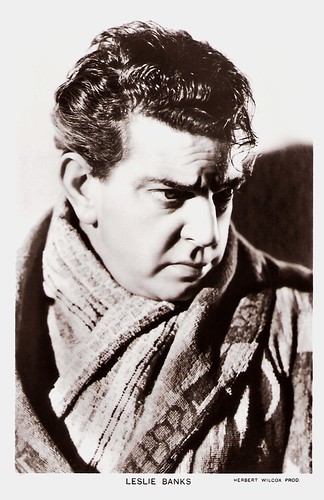
British postcard in the Picturegoer Series, London, no. 919a. Photo: Herbert Wilcox Prod. Publicity still for Three Maxims (Herbert Wilcox, 1936).
Leslie James Banks, CBE was born in West Derby, Liverpool, Lancashire, in 1890. His parents were George and Emily (née Dalby) Banks. He attended school at Glenalmond College in Scotland and later studied at Keble College, Oxford with the intention of becoming a parson but decided against this.
Banks joined Frank Benson's company and made his acting debut in 1911 at the town hall, Brechin, playing Old Gobbo in The Merchant of Venice. He then toured the United States and Canada with Henry V. Esmond and Eva Moore in 1912–1913.
Returning to London, he appeared for the first time on the West End, as Lord Murdon in The Dangerous Age in 1914. During the First World War he served with the Essex Regiment. He suffered injuries that left his face partially scarred and paralysed. This later disqualified him from many leading roles that required handsome actors.
In his acting career he would use this injury to good effect by showing the unblemished side of his face when playing comedy or romance and the scarred, paralysed side of his face when playing drama or tragedy. After the war, Banks joined the Birmingham Repertory Theatre. He returned to London in 1921 and established himself as a leading dramatic actor and West End star known for his powerful yet restrained performances.
Working in both London and New York City, he gained prominence on both sides of the Atlantic, and it was when he was in New York that Kenneth Macgowan persuaded him to go to Hollywood. Banks formidable bulk and intimidating face served him well in his first important film role in The Most Dangerous Game (Irving Pichel, Ernest B. Schoedsack, 1932). He played the sadistic Russian Count Zaroff, a diabolical hunter who arranges for a ship to be wrecked on an island where he can unleash his vicious dogs and hunts the passengers in the jungle for sport.
Ralph Michael Stein at IMDb: “Zaroff is, of course, evil but he's also oddly sympathetic. What's a count to do when he can buy anything and only the most extraordinary hunting will bring him happiness? In that light his trophy room becomes understandable, his bloody diversion almost sympathetic. Banks is very effective in this role where he swings between culture and carnage.” The film is based on a 1924 short story of the same name by Richard Connell and also features Joel McCrea and Fay Wray.
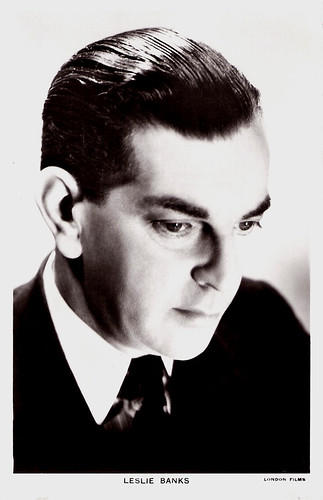
British postcard in the Picturegoer Series, London, no. 818. Photo: London Films.
For the rest of his career, Leslie Banks divided his time between Britain and the United States and between film and theatre. One of his most successful films was the British thriller The Man Who Knew Too Much (Alfred Hitchcock, 1934) with Edna Best and Peter Lorre.
José Luis Rivera Mendoza at IMDb: “The performances by the actors are of an excellent quality, with Leslie Banks leading the cast with his charming presence and very British wit. His ability to mix drama with comedy makes his character a very real and likable person, that portrays remarkably the everyman placed in an uncommon situation.”
Hitchcock remade the film in 1956 with James Stewart, but the two films are very different in tone, in setting, and in many plot details. Hal Erickon at AllMovie: “the original 1934 version of The Man Who Knew Too Much is arguably a more historically significant and aesthetically interesting film. It was Hitchcock's first true international hit.”
A box office smash was Farewell Again/Troopship (Tim Whelan Sr., 1937), a multi-plotted British comedy-drama about soldiers on leave and the people they've left. Other film with Banks include the historical drama Fire Over England (William K. Howard, 1937) notable for the first pairing of Laurence Olivier and Vivien Leigh, and Hitchcock’s last British film Jamaica Inn (Alfred Hitchcock, 1939) with Charles Laughton and Maureen O’Hara in her first major film role.
Against 'type', Banks starred in British mystery film The Arsenal Stadium Mystery (Thorold Dickinson, 1939), as the eccentric Inspector Anthony Slade. Jim Cross at IMDb: “He plays a curious character who we meet rehearsing policemen in full uniform AND tutus for some sort of theatrical performance! Further, he has a large selection of different hats that he self-consciously picks from every time he has to go and perform some task; when he has to delegate an arrest to his sergeant, he even delegates the appropriate (fishing) hat to him also! Altogether, the character played is fascinating and odd: an English eccentric or a (coded- it is 1939!) gay characterization? Either way, it is Leslie Banks' playing that makes this film at all worth watching...”
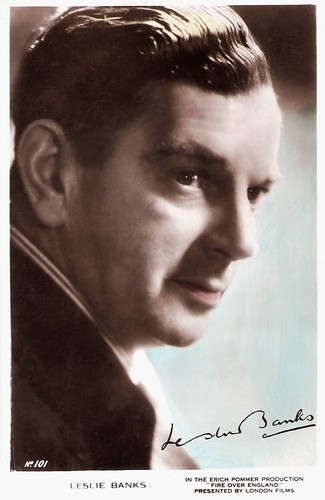
British postcard by Art Photo, no. 101. Photo: London Films / Erich Pommer Production. Publicity still for Fire over England (William K. Howard, 1937).
Leslie Banks appeared as the Chorus in Henry V (1944), Laurence Olivier's brilliant Technicolor film adaptation of William Shakespeare's play of the same name.
Bruce Eder at AllMovie: “Laurence Olivier's Henry V confounded almost every assumption about bringing Shakespeare's work to the screen. In contrast to previous Shakespeare adaptations, it was fresh and lively -- even challenging and daring -- in its presentation and structure; it had fun with its subject, while other versions had been reverent and respectful; and it delighted audiences, scholars, and critics alike, becoming the first screen adaptation of a Shakespeare play to receive mostly enthusiastic reviews and turn a profit.”
Banks played a supporting part in the thriller The Small Back Room (Michael Powell, Emeric Pressburger, 1949) about the bureaucratic and personal frustrations of a crippled munitions expert (David Farrar) during World War II.
Banks’ final film was Madeleine (David Lean, 1950), based on a true story about Madeleine Smith (Ann Todd), a young Glasgow woman from a wealthy family who was tried in 1857 for the murder of her lover, Emile L'Angelier (Ivan Desny). The trial was much publicized in the newspapers of the day and labeled "the trial of the century". Banks played the authoritarian father, unaware of Madeleine's secret life.
His theatre roles included Eliza Comes to Stay (his American debut in 1914), Captain Hook in Peter Pan (his New York debut in 1924), Petruchio in William Shakespeare’s The Taming of the Shrew (1937), the kindly, doddering schoolmaster in the original 1938 staging of Goodbye, Mr Chips (1938), and James Jarvis in the Kurt Weill musical Lost in the Stars (1950).
Leslie Banks married Gwendoline Haldane Unwin in 1915 and the couple had three daughters: Daphne, Virginia, and Evangeline, who became an actress. Banks was appointed a Commander of the Order of the British Empire for his services to theatre in 1950, the year of his last appearances on stage and screen.
Leslie Banks died in 1952, aged 61, from a stroke he suffered while walking.
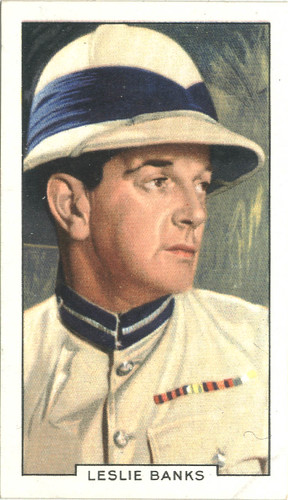
British collector's card by Gallaher in the Portraits of Famous Stars series, no. 10. Collection: Manuel Palomino Arjona (Flickr).
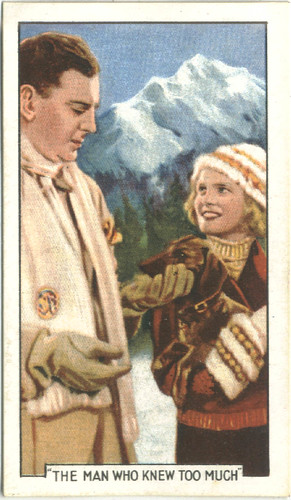
British collectors Card by Gallaher In the Famous Film Scenes, no 41. Leslie Banks and Nora Pilbeam in The Man Who Knew Too Much (Alfred Hitchcock, 1934). Collection: Manuel Palomino Arjona (Flickr).
Sources: Bruce Eder (AllMovie), Hal Erickson (AllMovie), Ralph Michael Stein (IMDb), José Luis Rivera Mendoza (IMDb), Jim Cross (IMDb), AllMovie, Wikipedia and IMDb.

British postcard in the Picturegoer Series, London, no. 919a. Photo: Herbert Wilcox Prod. Publicity still for Three Maxims (Herbert Wilcox, 1936).
A sadistic, diabolical hunter
Leslie James Banks, CBE was born in West Derby, Liverpool, Lancashire, in 1890. His parents were George and Emily (née Dalby) Banks. He attended school at Glenalmond College in Scotland and later studied at Keble College, Oxford with the intention of becoming a parson but decided against this.
Banks joined Frank Benson's company and made his acting debut in 1911 at the town hall, Brechin, playing Old Gobbo in The Merchant of Venice. He then toured the United States and Canada with Henry V. Esmond and Eva Moore in 1912–1913.
Returning to London, he appeared for the first time on the West End, as Lord Murdon in The Dangerous Age in 1914. During the First World War he served with the Essex Regiment. He suffered injuries that left his face partially scarred and paralysed. This later disqualified him from many leading roles that required handsome actors.
In his acting career he would use this injury to good effect by showing the unblemished side of his face when playing comedy or romance and the scarred, paralysed side of his face when playing drama or tragedy. After the war, Banks joined the Birmingham Repertory Theatre. He returned to London in 1921 and established himself as a leading dramatic actor and West End star known for his powerful yet restrained performances.
Working in both London and New York City, he gained prominence on both sides of the Atlantic, and it was when he was in New York that Kenneth Macgowan persuaded him to go to Hollywood. Banks formidable bulk and intimidating face served him well in his first important film role in The Most Dangerous Game (Irving Pichel, Ernest B. Schoedsack, 1932). He played the sadistic Russian Count Zaroff, a diabolical hunter who arranges for a ship to be wrecked on an island where he can unleash his vicious dogs and hunts the passengers in the jungle for sport.
Ralph Michael Stein at IMDb: “Zaroff is, of course, evil but he's also oddly sympathetic. What's a count to do when he can buy anything and only the most extraordinary hunting will bring him happiness? In that light his trophy room becomes understandable, his bloody diversion almost sympathetic. Banks is very effective in this role where he swings between culture and carnage.” The film is based on a 1924 short story of the same name by Richard Connell and also features Joel McCrea and Fay Wray.

British postcard in the Picturegoer Series, London, no. 818. Photo: London Films.
The Man Who Knew Too Much
For the rest of his career, Leslie Banks divided his time between Britain and the United States and between film and theatre. One of his most successful films was the British thriller The Man Who Knew Too Much (Alfred Hitchcock, 1934) with Edna Best and Peter Lorre.
José Luis Rivera Mendoza at IMDb: “The performances by the actors are of an excellent quality, with Leslie Banks leading the cast with his charming presence and very British wit. His ability to mix drama with comedy makes his character a very real and likable person, that portrays remarkably the everyman placed in an uncommon situation.”
Hitchcock remade the film in 1956 with James Stewart, but the two films are very different in tone, in setting, and in many plot details. Hal Erickon at AllMovie: “the original 1934 version of The Man Who Knew Too Much is arguably a more historically significant and aesthetically interesting film. It was Hitchcock's first true international hit.”
A box office smash was Farewell Again/Troopship (Tim Whelan Sr., 1937), a multi-plotted British comedy-drama about soldiers on leave and the people they've left. Other film with Banks include the historical drama Fire Over England (William K. Howard, 1937) notable for the first pairing of Laurence Olivier and Vivien Leigh, and Hitchcock’s last British film Jamaica Inn (Alfred Hitchcock, 1939) with Charles Laughton and Maureen O’Hara in her first major film role.
Against 'type', Banks starred in British mystery film The Arsenal Stadium Mystery (Thorold Dickinson, 1939), as the eccentric Inspector Anthony Slade. Jim Cross at IMDb: “He plays a curious character who we meet rehearsing policemen in full uniform AND tutus for some sort of theatrical performance! Further, he has a large selection of different hats that he self-consciously picks from every time he has to go and perform some task; when he has to delegate an arrest to his sergeant, he even delegates the appropriate (fishing) hat to him also! Altogether, the character played is fascinating and odd: an English eccentric or a (coded- it is 1939!) gay characterization? Either way, it is Leslie Banks' playing that makes this film at all worth watching...”

British postcard by Art Photo, no. 101. Photo: London Films / Erich Pommer Production. Publicity still for Fire over England (William K. Howard, 1937).
Fresh and lively - even challenging and daring
Leslie Banks appeared as the Chorus in Henry V (1944), Laurence Olivier's brilliant Technicolor film adaptation of William Shakespeare's play of the same name.
Bruce Eder at AllMovie: “Laurence Olivier's Henry V confounded almost every assumption about bringing Shakespeare's work to the screen. In contrast to previous Shakespeare adaptations, it was fresh and lively -- even challenging and daring -- in its presentation and structure; it had fun with its subject, while other versions had been reverent and respectful; and it delighted audiences, scholars, and critics alike, becoming the first screen adaptation of a Shakespeare play to receive mostly enthusiastic reviews and turn a profit.”
Banks played a supporting part in the thriller The Small Back Room (Michael Powell, Emeric Pressburger, 1949) about the bureaucratic and personal frustrations of a crippled munitions expert (David Farrar) during World War II.
Banks’ final film was Madeleine (David Lean, 1950), based on a true story about Madeleine Smith (Ann Todd), a young Glasgow woman from a wealthy family who was tried in 1857 for the murder of her lover, Emile L'Angelier (Ivan Desny). The trial was much publicized in the newspapers of the day and labeled "the trial of the century". Banks played the authoritarian father, unaware of Madeleine's secret life.
His theatre roles included Eliza Comes to Stay (his American debut in 1914), Captain Hook in Peter Pan (his New York debut in 1924), Petruchio in William Shakespeare’s The Taming of the Shrew (1937), the kindly, doddering schoolmaster in the original 1938 staging of Goodbye, Mr Chips (1938), and James Jarvis in the Kurt Weill musical Lost in the Stars (1950).
Leslie Banks married Gwendoline Haldane Unwin in 1915 and the couple had three daughters: Daphne, Virginia, and Evangeline, who became an actress. Banks was appointed a Commander of the Order of the British Empire for his services to theatre in 1950, the year of his last appearances on stage and screen.
Leslie Banks died in 1952, aged 61, from a stroke he suffered while walking.

British collector's card by Gallaher in the Portraits of Famous Stars series, no. 10. Collection: Manuel Palomino Arjona (Flickr).

British collectors Card by Gallaher In the Famous Film Scenes, no 41. Leslie Banks and Nora Pilbeam in The Man Who Knew Too Much (Alfred Hitchcock, 1934). Collection: Manuel Palomino Arjona (Flickr).
Sources: Bruce Eder (AllMovie), Hal Erickson (AllMovie), Ralph Michael Stein (IMDb), José Luis Rivera Mendoza (IMDb), Jim Cross (IMDb), AllMovie, Wikipedia and IMDb.
No comments:
Post a Comment